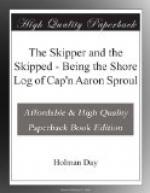“What? Me wear that bird-cage?” he roared, when they were out of hearing. “Not by the great jeehookibus!”
“Yes, you will,” returned Hiram, with the calm insistence of a friend. “You ain’t tryin’ to make out that what I do ain’t all right and proper, are you?”
Cap’n Sproul checked an apparent impulse to toss the bandbox into the roadside bushes, and after a moment tucked the thing under the seat to have it out of the way of his tempted hands. Then he wrenched off a huge chew of tobacco whose rumination might check his impulse toward tempestuous language.
He tried the hat on that night in the presence of his admiring wife, gritting curses under his breath, his skin prickling with resentment. He swore then that he would never wear it. But on the day of the race he carried it in its box to the selectman’s office, at which common meeting-place the three judges were to be taken up by the official barouche of the Smyrna Fair Association.
Under the commanding eye of Hiram Look he put on the head-gear when the barouche was announced at the door, and went forth into the glare of publicity with a furtive sense of shame that flushed his cheek. By splitting the top of his hack, Ferd Parrott, landlord of Smyrna tavern, had produced a vehicle that somewhat resembled half a watermelon. Ferd drove, adorned also with a plug hat from the stock of the Honorable Percival.
Just inside the gate of the fair-grounds waited the Smyrna “Silver Cornet Band.” It struck up “Hail to the Chief,” to the violent alarm of the hack-horses.
“We’re goin’ to get run away with sure’s you’re above hatches!” bellowed Cap’n Sproul, standing up and making ready to leap over the edge of the watermelon. But Hiram Look restrained him, and the band, its trombones splitting the atmosphere, led away with a merry march.
When they had circled the track, from the three-quarters pole to the stand, and the crowd broke into plaudits, Cap’n Sproul felt a bit more comfortable, and dared to straighten his neck and lift his head-gear further into the sunshine.
He even forgot the hateful presence of his seat-mate, a huge dog that Mr. Bickford had invited into the fourth place in the carriage.
“A very valuable animal, gentlemen,” he said. “Intelligent as a man, and my constant companion. To-day is the day of two of man’s best friends—the horse and the dog—and Hector will be in his element.”
But Hector, wagging and slavering amiably about in the narrow confines of the little stand to which they climbed, snapped the Cap’n’s leash of self-control ere five minutes passed.
“Say, Mr. Bickford,” he growled, after one or two efforts to crowd past the ubiquitous canine and get to the rail, “either me or your dog is in the way here.”
“Charge, Hector!” commanded Mr. Bickford, taking one eye from the cheering multitude. The dog “clumped” down reluctantly.




